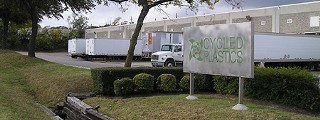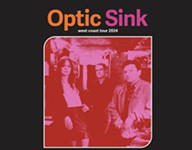Where You Can Stick Your Styrofoam
Cycled Plastics takes those recyclables that nobody else wants
By Daniel Mottola, Fri., April 18, 2008
I had been hoarding Styrofoam for months because I'd heard in passing, like some enviro-urban legend, that there was a company somewhere in Austin that actually recycled the ever-ubiquitous white foam. Luckily, considering all the bulky garbage bags full of restaurant to-go containers and odd-shaped packing materials I'd amassed, the rumor turned out to be true. Cycled Plastics, located near the corner of Burnet Road and Rutland, does indeed recycle Styrofoam – in addition to virtually all other types of plastics. But their operation, founded in 1991 by Adam Mosier, differs substantially from the type of recycling the public generally sees, as the majority of the materials they process arrive by the truckload from industrial sources.
Cycled Plastics' facility is half cavernous warehouse and half roaring factory: Forklifts unload 18-wheelers and stack giant crates of plastics according to type, density, and color. One machine shreds, washes, and dries No. 2 and 3 plastic bottles (think laundry detergent) and dispenses what looks like rainbow confetti. An even louder machine grinds and melts dark-colored foam and plastic bags, screens it for dirt, and pumps out what looks like spaghetti, which is then cut into pellets, dried, and boxed. The pellets, which resemble deep-purple-colored lentils, are sold by the 40,000-pound truckload, said managing partner Mike Largent, and they're "the highest-end recycled material a manufacturer is going to buy."
Instead of simply collecting, sorting, and bundling recyclables, Cycled Plastics sets itself apart by actually turning plastics back into food for new plastic items on-site. "We're interested in diverting materials from the landfill and finding solutions for how we can process them into raw goods," said Largent. He receives plastic from all types of businesses, ranging from furniture retailers left with loads of packing materials to manufacturers left with postindustrial plastic containers. "Over the last two or three years," he said, "companies that generate waste are thinking more about what they're throwing away." That's especially good news for Largent, who said that at the same time, "there's a drive on the plastics-manufacturing side to use more postconsumer materials as a result of an increased focus on the environment."
Differentiating recycling from downcycling, Largent explained that plastics have what's known as a "heat history," meaning that each time one is melted down, it loses strength. Manufacturers can create new, downcycled items – like reusable shopping bags made from plastic bottles – with up to 90% recycled content. But in order to maintain the same use, like making recycled shopping bags into new shopping bags, the postconsumer plastic must be combined with at least 25% virgin plastic.
In May, when the city begins collecting plastic bags curbside as part of a new 5,000-home pilot program, the bags will head to Cycled Plastics. According to Austin Solid Waste Services (which joins Whole Foods Market, Walgreens, Wal-Mart, HEB, and Randalls as part of the city-organized coalition working to boost reusable-bag use and disposable-bag recycling), 1.6 million pounds of plastic bags were bought and distributed between January and June 2006; of that number, 215,000 pounds were collected for recycling. Largent said other city-run plastic-bag-recycling efforts have been complicated by heavy contamination from trash, other recyclables, and debris. The solution to this problem, he believes, is in public-private partnerships that can deal with multiple types of waste. Such partnerships may play a crucial role in Austin's efforts to send zero waste (or darn close to it, as experts say) to landfills by 2040.
Largent hopes in the future to see manufacturers and distributors working with their upstream suppliers to standardize industrywide packaging. Computer housings, for example, are often made from a mix of plastics that vary by manufacturer and model, he said, which means they can't be processed together on a large scale by outfits like Cycled Plastics; instead, they often must be shipped to markets overseas. Meanwhile, Largent said, Cycled Plastics has surplus capacity and stands ready to assist Austin further. "We recognize that we're unique and that we're in an atmosphere where people are trying to be sustainable and green. We'd love to find new ways to go outside what's being done and divert more waste." For more info, see www.cycledplastics.com.
The following items are accepted at Cycled Plastics' public drop-off site, 10200 McKalla Place #100, open Monday-Friday, 7am-5pm.
• Packaging foams free of dirt or food contamination (EPS No. 6, PP No. 5, LDPE No. 4)
• No. 2 HDPE bottles that have been rinsed with caps removed
• No. 1 PET bottles that have been rinsed with caps removed
• No. 2 HDPE flowerpots that have been lightly washed to remove most of the dirt
• No. 4 LDPE bags that have had no food contact and have no paper contamination (labels, stickers)
Got something to say on the subject? Send a letter to the editor.









